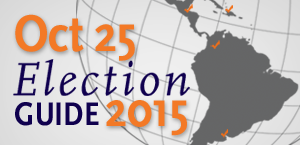Colombia Update: Gallup Poll Suggests Frontrunner in Bogota Mayoral Race
Colombia Update: Gallup Poll Suggests Frontrunner in Bogota Mayoral Race
Enrique Peñalosa has a comfortable nine-point lead per Gallup going into the October 25 race for Colombia’s second-most powerful position.
Two months ago, three candidates were in a statistical dead heat in the race for mayor of Bogota. October 5 poll released by Gallup Colombia shows Enrique Peñalosa breaking ahead of the pack with a comfortable nine-point lead less than three weeks before Colombia’s October 25 regional elections. Peñalosa has climbed steadily in Gallup polling since he joined the race this spring, while his closest rival, Rafael Pardo, went down by one point since the last poll in July, and Clara López, currently in third place, lost two. The survey has a five-point margin of error.
The Gallup result differed significantly from a Cifras y Conceptos poll released the morning prior, which showed Peñalosa and Pardo tied at 22 percent, with López at 19 and a margin of error of 3.2 percent. The variable poll results sparked polemics in recent days, with some publicly calling into question their impartiality. The candidates’ own responses vary as well, albeit more in line with their standing. Speaking to Noticias Caracol in response to the Gallup poll, Peñalosa called the results a “clear message” of the people, while Pardo said all the surveys were “respectable.” López, on the other hand, called the polls “completely contradictory” and said she and her colleagues were submitting a request for updated polling regulations. Fourth-place candidate Francisco Santos, whose support dropped from 13.4 to 9.5 percent from July to October, said, “We’re in a war of the polls. There’s a process of manipulation of public opinion that’s absolutely crazy and greatly harms the democracy.”
Whichever candidate gets the most votes on October 25 will win the election outright as there is no runoff. Current Mayor Gustavo Petro won with 32.3 percent of the vote in 2011—over Peñalosa, who garnered 24.9 percent. The new mayor of Bogota, commonly referred to as the second-most powerful position in the country, is one of thousands of officials who will be sworn in on January 1, 2016, along with governors for each of the country’s 32 departments, 1,101 other mayors, and more than 12,000 municipal posts.
Peace and Post-Conflict in the Polls and Platforms
But it’s not just local issues on the table: peace talks between the government and the Revolutionary Armed Forces of Colombia, known as the FARC, and the potential end to the hemisphere’s oldest internal conflict loom large, not the least for the repercussions a deal could have on the city in a post-conflict era. Bogota, which has taken in a 620,000 victims over the conflict’s 50 years, stands to receive several thousand demobilized FARC fighters of the estimated 7,000 remaining after the final peace accord is signed. After the two sides signed a landmark agreement on the issue of transitional justice on September 23, an October 3 poll by Ipsos-Napoleón Franco for Semana showed that Colombians’ support for the talks in Havana went up from a low point of 29 percent support this summer to 46 percent, although the pessimists still outweigh the optimists by six points overall.
Whoever is in the mayor’s office next year will need a plan for how to manage the city post-conflict. On the evening of October 5 at a televised roundtable discussion in the capital, candidates had the opportunity to present their post-conflict plans in the event the government and the FARC sign a final peace accord. Peñalosa and López declined to attend, but Pardo, who was a central figure in the peace agreement and subsequent demobilization of the M-19 guerilla group in the early 1990s, did so.









